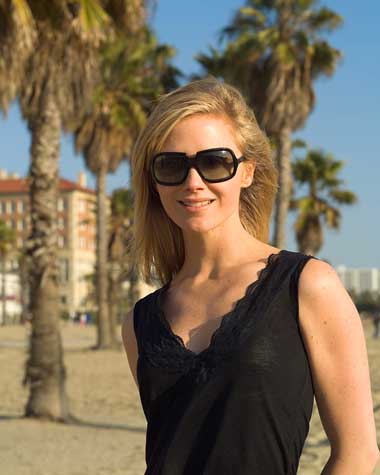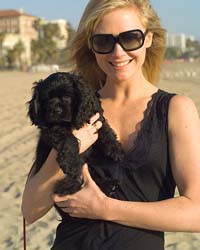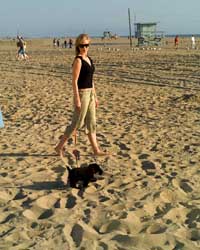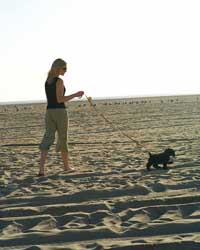
 ANY
of today’s actors join conservation, children’s or charity groups
to show off how worldly they are. In some cases, such as with the
late Sir Peter Ustinov or Audrey Hepburn, the concern is genuine,
but in many, you can’t help thinking whether it’s a PR
campaign. But there is no doubting new actress Jennifer Siebel. ANY
of today’s actors join conservation, children’s or charity groups
to show off how worldly they are. In some cases, such as with the
late Sir Peter Ustinov or Audrey Hepburn, the concern is genuine,
but in many, you can’t help thinking whether it’s a PR
campaign. But there is no doubting new actress Jennifer Siebel.
While Siebel isn’t a household name to most people,
she has been noticed. She had a small role in last year’s Jack Nicholson–Diane
Keaton romantic comedy Something’s Gotta Give, appeared in
Presidio Med and has had guest spots on She Spies
and Strong Medicine. The difference with San Francisco-born
Siebel is that she has volunteered at a hospital in Quito, Ecuador
and been a long-time member of Conservation International before
she established her acting career. Somewhere between all this, she
graduated from Stanford University with a BA
and a postgraduate degree from its business school.
Now 29 and looking at least five years younger,
she was born to two well respected parents: Ken Siebel, entrepreneur
and investment manager, and Judy Siebel, co-founder of the Children’s
Museum of Sausalito and a board member on various charities. This
explains some of her own character and concern about social policy.
‘My parents are true philanthropists,’ she told
Lucire, ‘and are always supporting charities and various
organizations that can help other people’s livelihoods and perhaps
even influence their direction in life. I believe they give beyond
their means relative to what others with more money could do.’
The Siebels are no strangers to hard work. ‘My Dad is a self-made
man. He grew up having to get sports’ and academic scholarships to
go to school because his parents had so little. His Mom and Dad worked
the day and night shifts at a local steel mill in Illinois.’ At one
point, Ken Siebel was a professional basketballer.
A trip to Africa when she was 12 heightened her
concerns. ‘It was then that I realized how fortunate I was, but
that I had grown up in a bubble of sorts. It made me want to know
more about other cultures and people and how to make for a happier,
safer, healthier world. I decided then and there that I wanted to
live in Africa someday and contribute to making the world a better
place.’
While still a child, Siebel was introduced to
Conservation International, and one summer during high school, she
went to Costa Rica to work for the group (she speaks fluent Spanish).
CI, a global movement founded by Peter
Seligmann (‘one of my favourite people in the world … [He] has such
empathy for the greater world and our responsibility to it’), is
known for its strong conservation strategies in some of the environmental
hotspots on Earth, and works alongside the United
Nations Environment Programme (for whom Lucire is its
first fashion industry partner) on some projects.
The Costa Rica experience took a toll physically
when Siebel came down with a parasite and had to return early, but
it was an eye-opening cultural experience. ‘I was entranced by this
other culture and way of life, … the freedom associated with it
and the desire to improve the livelihoods of people in developing
countries, whilst helping them to protect their environment.’
This passion stayed with her when she went to
university. Her BA was in Latin American
studies and human biology with a focus on third-world development
and conservation policy. While at Stanford, she was a Kappa Kappa
Gamma, a nationwide sorority known for its tradition of leadership
and philanthropic activities.
It was after college that Siebel embarked on a
journey that many who had grown up with the comforts of a fairly
affluent northern Californian lifestyle would think twice before
taking: volunteering at a children’s hospital in Quito. It did convince
her that studying medicine was not an option (‘I fainted every time
I saw blood’) and she still finds her choice of acting as a profession
‘funny … [but] it challenges me and makes me feel strangely alive,’
she said.
‘If I were to have become a doctor, I would be
working in developing countries today. I thought I had better try
to effect change some other way.’
Like Costa Rica, she found it added to her growth.
‘[Ecuador] is so rich and colourful in so many ways and its natural
springs–bath system in the countryside is so beautiful, not to mention
extremely healthy.’ Not that she did not leave without disappointments.
She witnessed a health system that left aside its alternative methods
in favour of ‘popping pills’; preventive methods were not considered.
In some respects, this strengthened her resolve
to do more.
Given her father’s struggle to attend school,
it was no surprise that Siebel valued a complete education. Growing
up around business-people and admitting to be an entrepreneur at
heart, Stanford Business School seemed a logical institution for
her graduate studies. She studied there while attending the American
Conservatory Theatre during the evenings.
‘When I lived in Africa, I was trying to figure
out a way to help the local artisans by exporting some of their environmentally
sound arts and crafts back home. Stanford Business School enabled
me to focus on entrepreneurship and global management.’
CONTINUED

|



The Hollywood image held by
the outsider is one of shallowness; Siebel’s interests show
her to be a deep thinker. She sees the conflict, calling herself
‘a living dichotomy’
|

